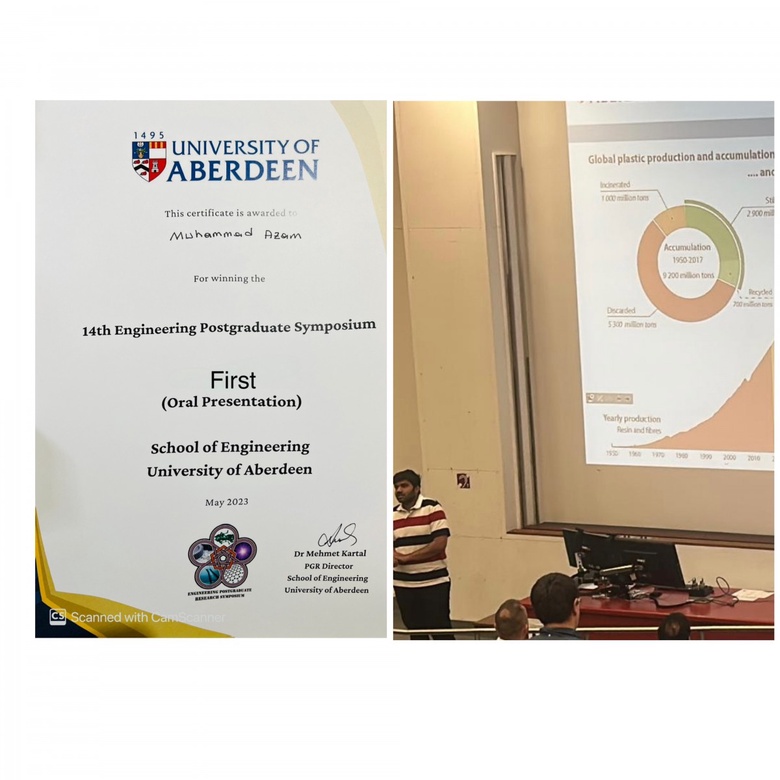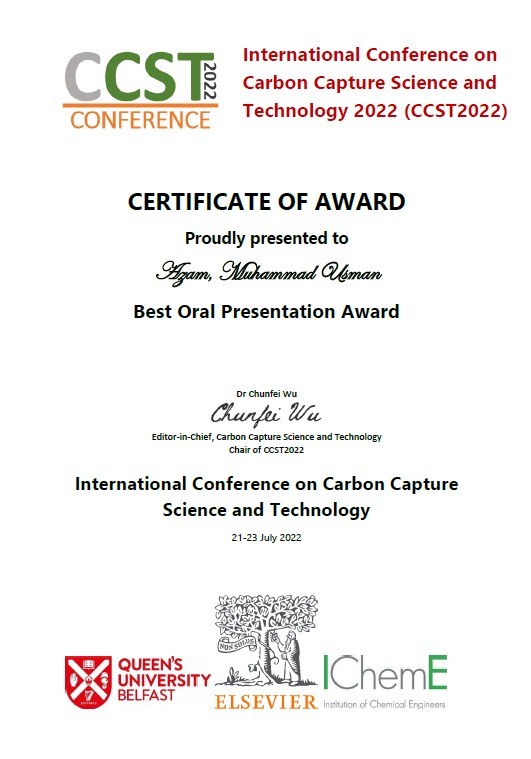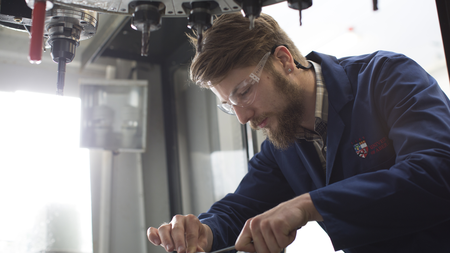
PhD
Research PG
- About
-
- Email Address
- m.azam.20@abdn.ac.uk
- Office Address
- School/Department
- School of Engineering
Biography
I am working on chemical yet sustainable pathways to convert waste plastics into valuable products utilizing heterogeneous catalysis. Life cycle assessment and process simulation are also a part of my research while working under the supervision of Dr Waheed Afzal and Dr Ines Graca.
Qualifications
- BSc Chemical Engineering2016 - University of the Punjab
- PhD Chemical Engineering2023 - University of Aberdeen
- MSc Health, Safety and Environment2018 - Universiti Teknologi Malaysia
Prizes and Awards
Won 1st position in the 14th Engineering Symposium held on 17th May 2023 at the University of Aberdeen

Won the best oral presentation award during CCST 2022

- Research
-
Research Areas

Engineering
Research Specialisms
- Chemical Engineering
- Nanotechnology
Our research specialisms are based on the Higher Education Classification of Subjects (HECoS) which is HESA open data, published under the Creative Commons Attribution 4.0 International licence.
Current Research
The conversion of waste plastics to fuel and energy productsThe remarkable properties of plastics make them the most commonly used modern materials since early twentieth century. Every year several hundreds of millions of tons of plastics are produced globally. After their useful life, millions of tons of waste plastic end up in urban waste, including large quantities floating in world oceans and causing all kinds of environmental problems. Conventional methods of waste plastic management include landfilling and incineration. However, chemical recycling methods could be a much more promising way forward. Hydrocracking waste plastic into liquid fuels and other value-added chemical products could be an advantage. The quality and yield of the fuel obtained from plastics depend upon the feedstock, reaction conditions and, above all, the catalyst. Different previously published studies reported the suitability of metallic-based catalysts supported on mesoporous silicas, zeolites, aluminas, silica-aluminas, etc. These studies often lack the suitability of the catalyst for a mixed plastic feed and catalyst recyclability. This project aims at engineering new bifunctional metal/solid acid catalysts that produce good-quality liquid fuels and are robust for the range of mixed feedstock at relatively mild conditions. I am working on reaction engineering and chemistry and on experimental and theoretical work. The project also involves the design of catalysts, their physicochemical characterization through various analytical methods (N2 physisorption to determine textural characterisation, TGA, FTIR, XRD, etc), and test under reaction conditions in laboratory-scale reactors. The main goals of this project will be, thus, to develop cost-effective heterogeneous catalysts with exceptional performance for the hydrocracking of plastics, understand the behaviour of the catalysts, study the reaction mechanisms and kinetics involved and, based on this knowledge, perform kinetic modelling." I plan to bring my passion for developing sustainable and valuable chemicals and my broader vision of advancing technologies that help meet the UN’s Sustainable Development Goals.
Past Research
I strategically sought out research opportunities which focused on developing technologies for producing greener fuels to reduce society’s reliance on fossil fuels and to help address the environmental impact of our modern energy systems. Specifically, most of my research experience has been in developing (i.e. Sol-gel method, hydrothermal method etc.), characterizing (i.e. XRD, RAMAN, FESEM, HR-TEM, BET, N2 adsorption-desorption, UV-visible, PL spectroscopy, and XPS analysis), and testing catalysts (namely photocatalysts) for both slurry and gas-phase reactions and through utilizing different reactor assemblies and engineering approaches to produce: (i) renewable hydrogen which is considered as a clean fuel with high combustion efficiency; and (ii) syngas which is used to produce hydrogen for the Haber process.
Funding and Grants
Leverhulme Trust Awards
